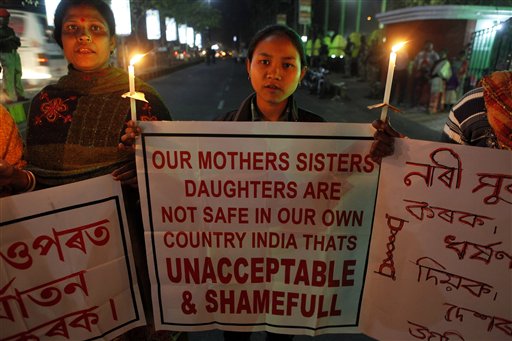Throughout my search to find the perfect college, dozens of people have told my mother to not allow me to attend a city school, fearing the risk of crime, specifically sexual assault. Myself and all women throughout the world have been left with no choice but to go along with society’s weak argument against rape, somehow blaming the victim for the terrible wrong that has been done to them. Their only option is to become severely precautious themselves, believing the disturbing myth that this vicious act is bound to happen if a woman wore certain clothes or acted a certain way.
My passion for social services has truly opened my eyes at our society’s beliefs on many different things, and recently I have been outraged and upset because of a particularly alarming and terrifying taboo in our society- rape.
I remember class discussions both in Sociology and British Literature about the familiar parental trend that gives more rules and limitations to daughters than to sons. I wondered- why is that? Why do some parents give their sons more freedom and less guidance than they give their daughters? Common sense would lead me to believe that it is because of the many frightening things that can happen to daughters.
In December 2012, I saw a heartbreaking news story about a 23 year old Indian woman (whose name has not been released) who was brutally gang-raped and beaten on a bus in New Delhi. Six people are accused of assaulting the woman on December 16, robbing her and her male travel companion and leaving them to die on the side of the dirt road.
Although the male has since been discharged and recovered, the courageous young woman’s fight for her life tragically came to an end on Friday, December 28, because of the detrimental injuries to her brain and serious organ failure.
This tragic incident has sparked large-scale anti-rape protests in India. Hundreds of thousands of women and men are honoring this innocent woman’s life through peaceful vigils and protests.
Students and women of all ages, from child to elderly, joined together to march for the safety and justice of all women during the past few weeks in New Delhi. Citizens are hoping to bring about a change to the country’s rape laws, which apparently are commonly unobserved.
Unfortunately, talking about sexual violence in India is taboo; it is commonly pushed out of the spotlight in the culture, causing some women to fear for their lives if they were to report an incident.
According to the Associated Press, prior responses to sexual violence in India were directing women to dress modestly and to not be out during dark hours to avoid sexual violence.
This is a terrifying and startling discovery that triggers my memory of those discussions in Sociology and English classes at school. Why does our society ostracize women victims rather than punish the attackers who are responsible? Why did that innocent young Indian woman have her life taken away from her far too early through this indecent act which happens on a daily basis because of loose and neglected anti-rape laws?
It is very shocking to me that this stereotype has reached this severity, especially during this so called accepting time that is the 21st century. If parents were to educate their sons as much as they educated their daughters about the crime of rape and sexual violence, a revolutionary idea could convince society that the victim is in no way at fault for this horrific crime. But in order to accomplish this, the societal taboo must be unveiled, and people must start to communicate.
This can be applied to the United States as well as probably every country in the entire world. I sincerely hope that this young woman’s life will be honored through justice and a universal change on society’s response to rape. Instead of young girls being forced to hide from the world, boys should be taught how to properly behave so we can aim to avoid these assaults all together.
Sources:
http://www.cnn.com/2012/12/27/world/asia/india-rape-protests/index.html

